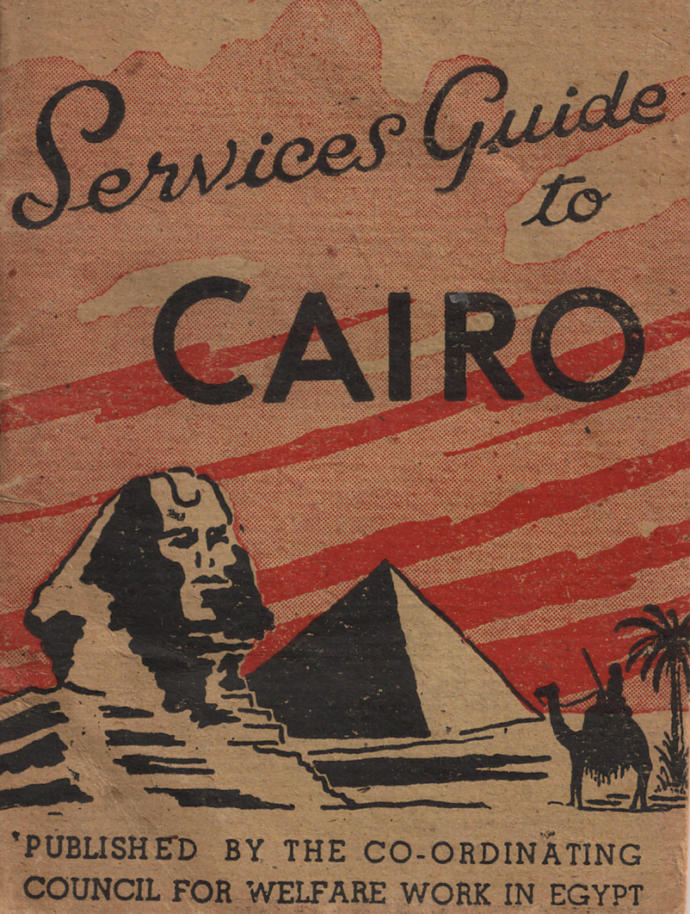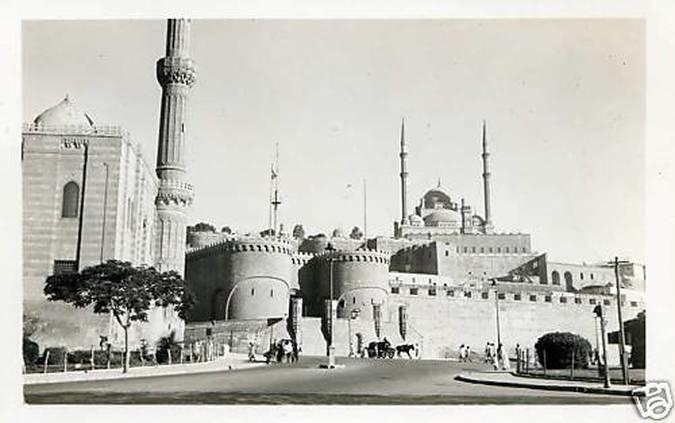
A few months ago, my aunt was clearing out her house, and discovered my grandfather's war diaries, which nobody had seen for many decades, and which nobody ever appears to have read before now, in addition to his wartime passport, and a series of letters from the Boer War (the South African letters are obviously not in direct connection with my grandfather).
I've slowly been reading through the diaries, and have learned a great deal that I never knew about my grandpa, not just about his experiences in the Royal Air Force in Egypt, but also about the kind of man he was.
My gal has also had a look through them, and believes that they should, in due course, find their way to the Imperial War Museum, where scholars will be able to access them. She has an interest to declare, as she compiles collections and displays for museums.
I'm very undecided about this. I'm certainly not opposed to sending a transcript there, but feel that the original manuscript is something to be kept in the family. She has countered that it will deteriorate (there is already evidence of this) and needs to be kept in controlled conditions.
The experiences he describes are by no means unique, but they are certainly colourful and interesting.
So, G@G - what do you think - does stuff like this belong in a drawer in my desk, or should it be sent to a facility where it can be properly looked after, and accessed by others?
If anybody is interested (and I can completely understand if you think Too Long, Didn't Read), here is an excerpt that gives an idea of the flavour of it (photographs not his, but contemporary ones found on the net).

Some Mean City
Cairo, at first glance, looks quite impressive. From Almaza, it is approached through Heliopolis, a residential quarter of modern many-storied houses, or blocks of flats, clean, tidy, fairly artistic and each having a small garden. The streets are broad, and there is a Metro, a very up to date light railway.
In the city, the buildings are on the same lines, but dirtier, the streets wide, but littered, the traffic a hopeless conglomeration of beautiful American and German cars, taxis that date back to the Flood, lorries, barrows and the gharris. The latter are four-wheeled vehicles, drawn by two horses. The driver is usually a bandit, who relies entirely upon his whip and only uses the reins to stop his steeds. A large hood provides shade and helps to screen the female of the species from lustful eyes. The taxis are the most awe-inspiring vehicles that it has ever been my lot to ride. Their devil-may-care drivers have no regard for the safety nor the comfort of their passengers. Speed is the only consideration. Take away the horn and they would be helpless. Their traffic sense was jettisoned early in their career. And woe betide the swadi who ventures into one that has no meter! He will pay through the nose. After the trip, the passenger finds he has inevitably become host to a horde of insects of the vampire type - bugs as big as boars. And all the above mentioned traffic roars through the streets, horns blaring, with cyclists and pedestrians, defying death each time they venture among these war chariots.

The inhabitants of this metropolis are divided into two sharply defined classes, the rich and the poor. The rich ignored us, the poor robbed us. A horde of bootblacks swept down on each tramload of servicemen. "Shine, shine, bags of b____t, George!" Every man in uniform is George to these pests. In desperation, one consents to a shine. The bootblack conducts his victim to a relatively quiet spot, and usually starts by demanding ten piastres for his services, supplementing his supplications by threats to empty his polish bottle over the victim's clothes. We found that carrying a riding crop was essential. Then we could match threats with a significant swing of the crop. Once the shoes are shined, the bootblack driven off with an acker for his work, one could continue. After proceeding another fifty yards, another horde of bootblacks would descend upon poor 'George'. If he cursed them or threatened them, they had a delightful trick of throwing a horrible black paste across the toe of his newly shined shoe, making another shine necessary. I've known chaps have four shines in two hours.
Next in line to the bootblacks as pests are the pedlars. They carried trays of every conceivable thing - leather goods, shoelaces, fountain pens, matches, jewellery, postcards (including a pocketful of the French variety). Each George in turn was beset by them, and harried and chivvied until he must have felt death would be preferable.
Nor were the shopkeepers any better. There were many shops filled with stock to which in England we were strangers. But did one as much as hesitate, before a shop window, and two or three salesmen would be out to lure one in. There were silk stockings, pyjamas and dressing gowns, watches, filagree jewellery, olivewood carvings, beaten brass, parquet inlaid boxes and so on. These were the tourist shops, where prices were three and four times the actual value, and where by judicious bargaining, one could halve the original demand, and still pay twice the article's actual worth. There are countless barbers' shops, too, each bellowing for custom. One leaves a shop, having had a shave, haircut, hot towels, frictions, electric massage (the original demand may have been for a shave), and twenty yards on, one is beset by white-coated, greasy-haired operators, saying "Shave, George? Haircut, George?" A usual gag in these places is to have two or three personable wenches to do the massages. Women-starved tommies never seem able to resist!
The first two visits were spent in making the rounds of the Services' Clubs, mostly to be free of persecution. The best of them all, the New Zealanders', was a massive place, with excellent cooking, ice creams, showers etc, but far too crowded. The Springbok was smaller, but very comfortable. The gem of them all was the Rhodesia Club. I visited with Ernie (it was exclusively for Rhodesians and their guests) and found it heaven. It is situated on the top but one story of the highest building in Cairo, the Immobilier Building. It has a bar, a dining room, a lounge, a roof garden, on that floor, and on the one below, are the bedrooms. The view from the roof gardens and balconies embraces the whole of Cairo, the citadel, the pyramids and the various mosques. The whole atmosphere of the club is summed up in the notice that hangs above the bar - "Abandon Rank - all ye who enter here!"

Ernie and I decided to see all there was to see of Cairo in those two days. We visited the 'Morocco' - typical of the cabaret bars of the city. An L-shaped room with a postage stamp sized dancefloor is served by a bar at one end. A dance band plays sporadically, and men may secure as partners the girls who also give the cabaret show. It is an expensive business, as the price of their company is to buy as many drinks at 15 piastres each, as the girl can consume, or the man is mug enough to pay for. I saw two girls cost a couple of sergeants £3 in less than an hour. The drinks are a wine glassful of cider, and the girl reserves a proportion of the price.
The cabarets are generally lousy. They consist of a few dances (always the stomach stuttering 'Eastern Dance') ,performed by nauseating obese naked bodies in a lackadaisical style, to the accompaniment of catcalls, and obscene remarks from the more tipsy spectators. Throughout the evening, these girls will hold out to their dupes the prospect of joys to come, but I have never met a man who has slept with one of them.

For experiences of that kind, the Tommy resorted to the Berkha (since closed), which was simply a street of brothels, supervised by the Army. Ernie and I visited that, too - as spectators. The first "louse" was enough for me. There was a queue of men, on the stairs, awaiting the ministrations of three girls, at least fifty men, I reckoned, shuffling forward at an amazing speed. The "girls" were horrible specimens, and the whole idea made me retch. I couldn't understand how this crowd of men could approach the matter so cold-bloodedly, standing there with 20 or 30 piastres in their hands. Perhaps the difference was that they were drunk, and I was sober.
The majority of the better class Egyptians ignored the troops. We were an evil to be borne. Rommel was knocking at the gates of the Delta. In a few days' time they might have German overlords, so to hell with the Tommies.
Most Helpful Opinions